Sustainable Accommodations and Green Certifications in the Dominican Republic
Understanding Sustainable Accommodations
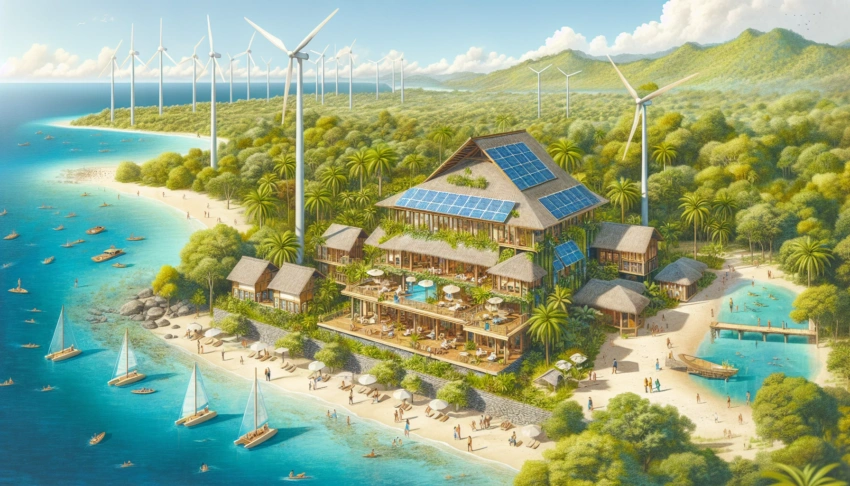
Sustainable Accommodations and Green Certifications in the Dominican Republic
Sustainable accommodations are not just a trending topic; they are a crucial element in the movement towards a more environmentally responsible tourism industry. By understanding what makes accommodations sustainable and why they are important, travelers can make informed choices that benefit both the planet and local communities.
1. Defining Sustainable Accommodations
Sustainable accommodations are defined by their commitment to minimizing their environmental impact, supporting local economies, and promoting cultural heritage. These establishments adopt eco-friendly practices that range from reducing energy consumption and waste to sourcing local and organic materials.
Criteria that make accommodations sustainable include:
- Utilization of renewable energy sources such as solar or wind power.
- Implementation of waste management systems to recycle and compost.
- Water conservation techniques like rainwater harvesting and low-flow fixtures.
- Supporting local communities by sourcing food and materials from local suppliers.
- Promoting cultural awareness and preserving local traditions.
Eco-friendly practices not only help protect the environment but also enhance the overall experience for guests by providing a more authentic and meaningful stay.
2. Benefits of Choosing Sustainable Accommodations
Choosing to stay in sustainable accommodations offers numerous benefits. Environmentally, it reduces carbon footprints and helps preserve natural resources. Economically, sustainable hotels often support local businesses and communities, creating jobs and boosting the local economy. Socially, these accommodations foster cultural exchange and understanding, enriching the travel experience for both guests and locals.
Moreover, many sustainable properties offer unique experiences such as farm-to-table dining, eco-tours, and workshops on local crafts, allowing guests to engage more deeply with the destination.
Travelers who choose sustainable accommodations contribute to a positive cycle of responsible tourism, encouraging more hotels to adopt green practices and invest in sustainability. This not only meets the growing demand for eco-friendly travel options but also ensures the long-term viability of the tourism industry.
3. Challenges in Implementing Sustainable Practices
While the benefits of sustainable accommodations are clear, there are several challenges that hotels may face when implementing green practices. One major obstacle is the initial cost of transitioning to more sustainable operations, such as installing energy-efficient systems or sourcing eco-friendly materials. This can be particularly tough for smaller establishments with limited budgets.
Additionally, there is often a lack of awareness or understanding among hotel management and staff about sustainable practices, which can hinder implementation. Training and education are essential to ensure that everyone within the organization is on board and knowledgeable about sustainability efforts.
Another challenge is balancing guest expectations with sustainability goals. Some guests may be resistant to changes such as reducing towel and linen laundry or eliminating single-use plastics, emphasizing the need for effective communication and education to highlight the benefits of these practices.
Despite these challenges, the growing demand for sustainable travel options is driving many accommodations to overcome these obstacles and prioritize sustainability, paving the way for a more eco-conscious future in tourism.
Overview of Green Certifications
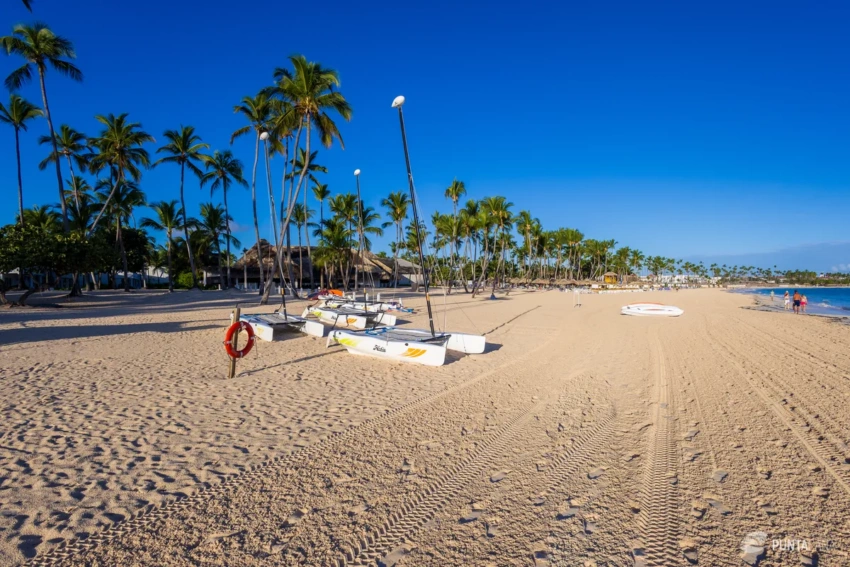
Punta Cana
In the dynamic world of hospitality, green certifications have become the golden seal of approval for accommodations aiming to go green. These certifications not only reassure eco-conscious travelers but also encourage hotels to adopt sustainable practices that benefit the planet.
1. What Are Green Certifications?
Green certifications are formal recognitions awarded to accommodations that adhere to specific environmental standards. They serve as a testament to a property’s commitment to sustainability, covering areas such as energy efficiency, water conservation, waste reduction, and the use of sustainable materials. These certifications are crucial because they provide a transparent and reliable measure of a hotel’s green initiatives, allowing travelers to make informed choices.
In the hospitality industry, these certifications not only enhance a property’s reputation but also contribute to global environmental goals. As more travelers seek out eco-friendly options, certifications act as a competitive advantage, attracting a growing segment of environmentally conscious guests.
2. Common Green Certifications in the Hospitality Industry
Several reputable organizations offer green certifications, each with distinct criteria and focus areas. Here are some of the most recognized certifications in the hospitality industry:
- LEED (Leadership in Energy and Environmental Design): Developed by the U.S. Green Building Council, LEED is one of the most widely recognized green building certification systems globally. It evaluates a building’s design, construction, and operation, promoting energy savings and sustainable site development.
- Green Globe: This certification focuses on sustainable management, social and economic aspects, cultural heritage, and environmental practices. It is globally recognized and tailored specifically for the travel and tourism industry.
- EarthCheck: Based in Australia, EarthCheck provides a scientific benchmarking certification that measures the environmental and social impact of tourism businesses. It emphasizes data-driven improvements.
- Green Key: Originating in Denmark, Green Key is an eco-label awarded to hotels, campsites, and other leisure establishments. It focuses on reducing environmental impacts and promoting sustainable tourism.
3. Criteria for Obtaining Green Certifications
To earn a green certification, accommodations must meet a range of criteria designed to assess their sustainability efforts. These criteria often include:
- Energy Efficiency: Implementing energy-saving measures, such as energy-efficient lighting and appliances, and utilizing renewable energy sources like solar or wind power.
- Water Conservation: Strategies to reduce water consumption, including low-flow fixtures, water recycling systems, and rainwater harvesting.
- Waste Management: Effective waste reduction strategies, recycling programs, and composting to minimize landfill contributions.
- Sustainable Sourcing: Using eco-friendly, locally sourced, and sustainable materials in construction and operations.
- Biodiversity Protection: Initiatives to preserve and enhance local flora and fauna, supporting native species and habitats.
Green Certification Comparison
| Certification | Focus Area | Global Reach | Key Benefit |
|---|---|---|---|
| LEED | Energy Efficiency | Global | Promotes sustainable building design |
| Green Globe | Comprehensive Sustainability | Global | Enhances tourism business practices |
| EarthCheck | Environmental Benchmarking | Global | Data-driven improvements |
| Green Key | Eco-Labeling | Global | Reduces environmental impacts |
By understanding and embracing these green certifications, travelers can align their accommodation choices with their environmental values, ensuring their adventures leave a positive footprint.
Our Best Tours in Punta Cana
Ready to explore Punta Cana while staying at a certified green hotel? Check out our exclusive tours that blend adventure with sustainability. Dive into the crystal-clear waters or trek through lush landscapes with our expertly curated excursions.
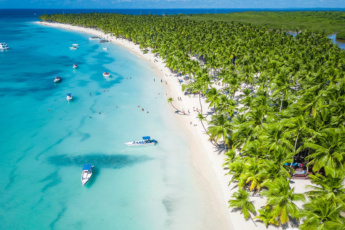
Saona Island Excursion - Caribbean Paradise
from $75 Read more
Swimming with Dolphins in Punta Cana - Top Adventure 2026 (50 minutes)
from $155 Read moreSustainable Accommodations in the Dominican Republic
The Dominican Republic is not just a paradise for beach lovers and adventurers; it’s also becoming a leading destination for eco-conscious travelers. With a growing emphasis on sustainability, the country is embracing eco-friendly tourism that offers both luxury and responsibility.
1. Eco-Friendly Resorts and Hotels
Eco-friendly resorts and hotels are sprouting across the Dominican Republic, offering travelers a taste of sustainable luxury. These accommodations are not just about minimizing environmental impact; they’re about enhancing the guest experience through innovative practices. From solar-powered energy systems to organic gardens that supply fresh produce for gourmet meals, these hotels are redefining hospitality.
Take, for instance, the Eco-Lodge in Samaná, known for its breathtaking views and commitment to sustainability. This lodge utilizes rainwater harvesting systems and natural ventilation, ensuring a minimal carbon footprint while providing a comfortable stay. Similarly, the Punta Cana Resort and Club is a pioneer in sustainable tourism, featuring one of the first zero-emission golf courses in the world.
2. Government Initiatives Supporting Sustainable Tourism
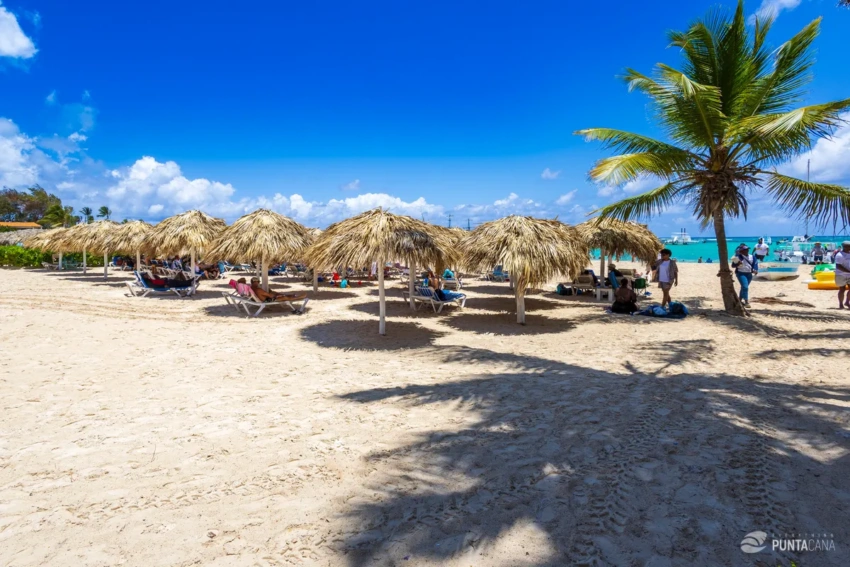
Punta Cana
The Dominican government plays a crucial role in promoting sustainable tourism, recognizing its potential to preserve the country’s natural beauty while boosting the economy. Through policies and incentives, the government encourages hotels to adopt green practices and seek certifications.
One standout initiative is the “Green Dominican” program, which offers tax incentives and grants to establishments that implement energy-efficient systems and waste-reduction measures. Moreover, the government collaborates with international organizations to provide training for local businesses on sustainable tourism practices, ensuring that they meet global standards.
3. Local Community Involvement in Sustainable Tourism
Local communities are the heartbeat of sustainable tourism in the Dominican Republic. By involving them in eco-friendly projects, not only do they benefit economically, but they also become stewards of their environment. Community-based tourism initiatives are flourishing, with locals leading tours, maintaining protected areas, and managing eco-lodges.
In regions like Bayahibe and Jarabacoa, community engagement has transformed tourism. Locals have been instrumental in conservation efforts, such as reforestation projects and wildlife protection programs. These initiatives not only protect the environment but also preserve the cultural heritage of the Dominican Republic, creating a holistic and enriching experience for visitors.
The Impact of Sustainable Tourism on the Environment
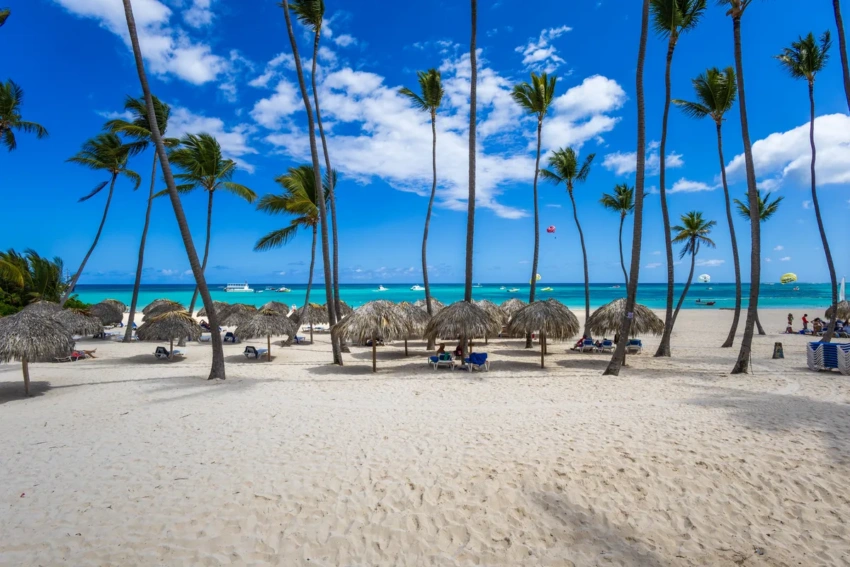
Punta Cana
Delve into the ripple effects of sustainable tourism as it weaves a greener tapestry across the Dominican Republic’s vibrant landscape.
Sustainable tourism in the Dominican Republic doesn’t just offer a guilt-free vacation; it plays a pivotal role in safeguarding the natural beauty that draws visitors from around the world. By adopting eco-friendly practices, hotels and resorts are reshaping the tourism industry to prioritize the planet, ensuring that the environment thrives alongside economic growth.
1. Reducing Carbon Footprint
Carbon footprint reduction is at the forefront of sustainable tourism. Many accommodations in the Dominican Republic are implementing renewable energy solutions like solar panels and wind turbines, significantly cutting down on fossil fuel consumption. By embracing energy-efficient appliances and promoting energy-saving practices among guests, these establishments are making a tangible impact.
The movement towards reducing carbon emissions doesn’t stop at energy consumption. Sustainable accommodations often opt for locally-sourced materials, reducing the carbon emissions associated with transportation. This not only supports the local economy but also lessens the environmental impact of their operations.
2. Conservation of Natural Resources
Water conservation is another cornerstone of sustainable practices. Many hotels have installed low-flow fixtures, rainwater harvesting systems, and wastewater recycling processes. These measures collectively contribute to a significant decrease in water usage, addressing one of the most pressing environmental challenges in the region.
Energy conservation goes hand in hand with water savings. Sustainable accommodations often use smart technology to control lighting and temperature, optimizing energy use without compromising guest comfort. These technologies ensure that lights are turned off when rooms are unoccupied and that air conditioning systems operate efficiently.
Efforts in Natural Resource Conservation
| Resource | Conservation Technique | Impact |
|---|---|---|
| Water | Low-flow fixtures, rainwater harvesting | Reduces water usage by up to 30% |
| Energy | Solar panels, energy-efficient appliances | Decreases energy consumption by 20-50% |
| Materials | Locally-sourced materials | Minimizes carbon emissions from transport |
3. Biodiversity Protection and Enhancement
Sustainable accommodations are also champions of biodiversity. By designing landscapes that mimic natural ecosystems, these establishments create habitats for local wildlife, supporting flora and fauna that might otherwise be displaced by development. Some resorts have even established on-site nature reserves or partnered with conservation groups to protect endangered species.
Through sustainable tourism, the Dominican Republic is setting an example for how the hospitality industry can contribute positively to environmental preservation, ensuring that the island’s breathtaking beauty is preserved for generations to come.
Our Best Tours in Punta Cana
Looking to immerse yourself in nature’s splendor while experiencing the best of sustainable tourism? Check out our top eco-friendly tours in Punta Cana that showcase the island’s commitment to the environment.

Punta Cana Private Boat Trip at the Best Price - 3-Hour Exclusive Tour with Snorkeling (from Jellyfish to Cabeza de Toro)
from $590 Read more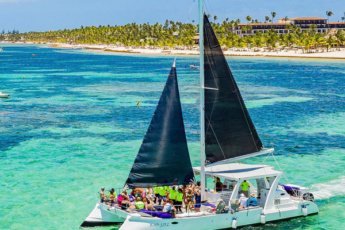
Power Cruise – Punta Cana Party Experience on the Bad Girl Catamaran
from $65 Read moreHow to Identify Sustainable Accommodations as a Traveler
Embarking on a journey to the Dominican Republic doesn’t just mean exploring its sun-kissed beaches and vibrant culture. It also offers a wonderful opportunity to make environmentally conscious choices. Selecting sustainable accommodations can significantly enhance your travel experience while contributing to the planet’s well-being.
1. Researching Accommodations for Sustainability
The first step in identifying sustainable accommodations is conducting thorough research. The internet serves as a vast resource for information, but knowing what to look for is crucial. When you search for hotels, include terms like “eco-friendly,” “sustainable,” or “green-certified” to filter your options.
Look for accommodations that clearly list their sustainable practices on their websites. This might include energy-saving measures, recycling programs, or water conservation efforts. Many eco-friendly hotels are proud of their initiatives and will provide detailed information about their efforts to reduce their environmental impact.
Key Indicators of Sustainable Hotels
| Indicator | Description | Example |
|---|---|---|
| Energy Efficiency | Use of energy-efficient appliances and renewable energy sources. | Solar panels, LED lighting |
| Water Conservation | Implementing methods to reduce water usage. | Low-flow showerheads, rainwater harvesting |
| Waste Management | Programs to reduce, reuse, and recycle waste. | Composting, recycling bins |
| Local Sourcing | Using locally sourced food and materials. | Farm-to-table dining |
2. Questions to Ask Before Booking
Once you have shortlisted potential accommodations, reaching out directly can provide deeper insights into their sustainability practices. Here are some questions you might consider asking:
- What specific sustainability initiatives do you have in place? This question can help you gauge the hotel’s commitment to eco-friendly practices.
- Are you certified by any green certification bodies? Certifications from recognized organizations can be a reliable indicator of genuine efforts.
- How do you support the local community? Sustainable hotels often engage with and benefit local communities, supporting social sustainability.
- What measures do you take to conserve resources? Understanding their approach to conserving energy, water, and reducing waste can clarify their environmental impact.
Engaging directly with the accommodation providers not only helps you make informed decisions but also signals to them that travelers prioritize sustainability. Your questions could encourage more transparency and commitment to eco-friendly practices.
3. Use of Technology in Identifying Green Hotels
In today’s digital age, technology offers innovative solutions for identifying sustainable accommodations. Numerous apps and websites are dedicated to helping travelers find eco-friendly options, making it easier than ever to incorporate sustainability into your travel plans.
Websites like Green Key Global and Eco Hotels & Resorts provide directories of certified green hotels around the world. These platforms often include detailed descriptions of the accommodations’ sustainable practices and certifications.
Additionally, mobile apps such as “Green Globe” and “Tripadvisor’s GreenLeaders” program provide user-friendly interfaces for locating and booking sustainable hotels. These apps allow you to filter options based on their eco-friendly features, ensuring that your stay aligns with your values.
Incorporating technology into your search for sustainable accommodations not only simplifies the process but also empowers you to make choices that align with your environmental ethos. As more travelers demand sustainability, the hospitality industry is likely to expand its eco-friendly offerings, making it an exciting time to explore the world responsibly.
Frequently Asked Questions
What are sustainable accommodations?
Sustainable accommodations are hotels, lodges, or resorts that prioritize environmental responsibility. They implement practices such as reducing energy consumption, conserving water, minimizing waste, and supporting local communities. In the Dominican Republic, these practices may include using solar power, recycling programs, and sourcing food locally.
What are green certifications?
Green certifications are official recognitions awarded to accommodations that meet specific environmental standards. These certifications assess a property’s sustainability practices, such as energy efficiency, water conservation, waste management, and community engagement. In the Dominican Republic, hotels may have certifications like Green Globe or Rainforest Alliance.
How can I identify sustainable accommodations in the Dominican Republic?
To identify sustainable accommodations, look for properties with recognized green certifications. You can also check their websites for information on environmental initiatives and read reviews from past guests to learn about their sustainability efforts.
Why should I choose a green-certified hotel in the Dominican Republic?
Choosing a green-certified hotel supports environmental sustainability and helps reduce your travel footprint. These accommodations often provide a more authentic experience by promoting local culture and using resources responsibly.
Are there any specific green certifications relevant to the Dominican Republic?
Yes, some common green certifications in the Dominican Republic include Green Globe and Rainforest Alliance. These certifications evaluate a property’s environmental and social sustainability practices.
What are some sustainable practices to look for when booking accommodations?
Look for accommodations that use renewable energy sources, have efficient water management systems, implement waste reduction programs, and support local communities. Such practices indicate a commitment to sustainability.
Can sustainable accommodations be luxurious?
Yes, sustainable accommodations can offer luxury experiences while maintaining environmental responsibility. Many high-end resorts in the Dominican Republic provide eco-friendly amenities and services without compromising on comfort or quality.
Are green-certified hotels more expensive than regular hotels?
While some green-certified hotels may be more expensive due to their investment in sustainable technology and practices, others offer competitive pricing. Additionally, staying at such accommodations can provide value through unique experiences and contributing to environmental conservation.
Is it possible that information about certifications may become outdated?
Yes, certification standards and the status of green-certified accommodations can change over time. It’s a good idea to check the latest information when planning your stay.
